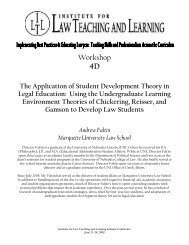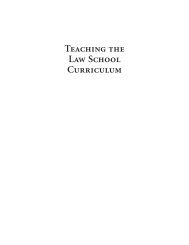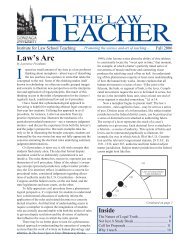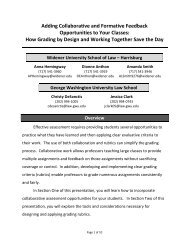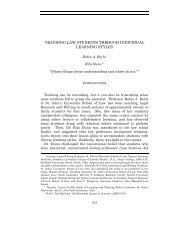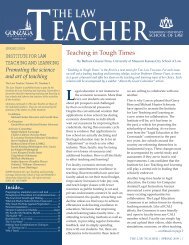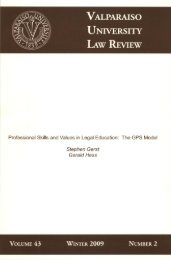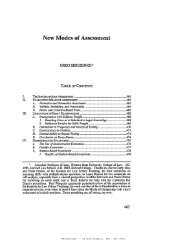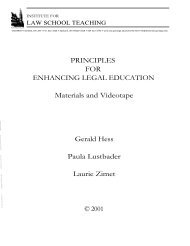Listening to Our Students - Institute for Law Teaching and Learning
Listening to Our Students - Institute for Law Teaching and Learning
Listening to Our Students - Institute for Law Teaching and Learning
Create successful ePaper yourself
Turn your PDF publications into a flip-book with our unique Google optimized e-Paper software.
942 UNIVERSITY OF SAN FRANCISCO LAW REVIEW [Vol. 31<br />
views of teaching <strong>and</strong> learning. The first branch articulates principles of<br />
effective adult education. The second branch describes the classroom assessment<br />
movement.<br />
A. Principles of Adult Education<br />
Legal educa<strong>to</strong>rs can improve their teaching <strong>and</strong> their students' learning<br />
by underst<strong>and</strong>ing basic principles of adult education <strong>and</strong> shaping their<br />
teaching <strong>to</strong> reflect those principles. Six principles are central <strong>to</strong> adult teaching<br />
<strong>and</strong> learning: voluntariness, respect, collaboration, context, activity, <strong>and</strong><br />
evaluation.<br />
1. Voluntariness<br />
Participation in learning is voluntary; adults engage in learning of their<br />
own volition. Adults pursue education because they want <strong>to</strong> develop new<br />
skills, sharpen existing skills, acquire new knowledge, <strong>and</strong> gain new insights.<br />
2 Adults are usually highly motivated <strong>to</strong> learn <strong>and</strong> are willing <strong>to</strong> engage<br />
in participa<strong>to</strong>ry learning methods such as discussion, simulation, <strong>and</strong><br />
small group activities. 3 However, adult learners quickly withdraw their participation<br />
if they feel that the education is not meeting their needs, does not<br />
connect with their past experiences, or is conducted at a level they find<br />
incomprehensible. 4 Furthermore, most adults will retreat if they are humiliated<br />
in the classroom. Intimidation does not facilitate adult learning. 5<br />
2. Respect<br />
Mutual respect <strong>for</strong> the self-worth of teachers <strong>and</strong> students underlies an<br />
effective teachingllearning environment. One of the central features of good<br />
teaching is that the students feel that instruc<strong>to</strong>rs value them as individuals. 6<br />
However, <strong>for</strong> learners <strong>to</strong> grow they must develop powers of critical reflection<br />
<strong>and</strong> accept challenges from teachers <strong>and</strong> fellow students <strong>to</strong> consider<br />
alternative ways of thinking <strong>and</strong> behaving. 7 There<strong>for</strong>e. a difficult but essential<br />
task <strong>for</strong> the teacher is establishing a classroom climate <strong>and</strong> culture in<br />
which students feel <strong>and</strong> show respect <strong>and</strong> are willing <strong>to</strong> challenge <strong>and</strong> be<br />
challenged. 8<br />
2. See Stephen D. Brookfield, Adult Learners: Motives <strong>for</strong> <strong>Learning</strong> <strong>and</strong> Implications <strong>for</strong><br />
Practice. in TEACHING AND LEARNING IN THE COLLEGE CLASSROOM 137, 142 (Kenneth A. Feldman<br />
& Michael B. Paulsen eds., 1994).<br />
3. See id.<br />
4. See id.<br />
5. See id. at 141.<br />
6. See id. at 143-44.<br />
7. See id. at 145.<br />
8. See id. at 141, 143.



